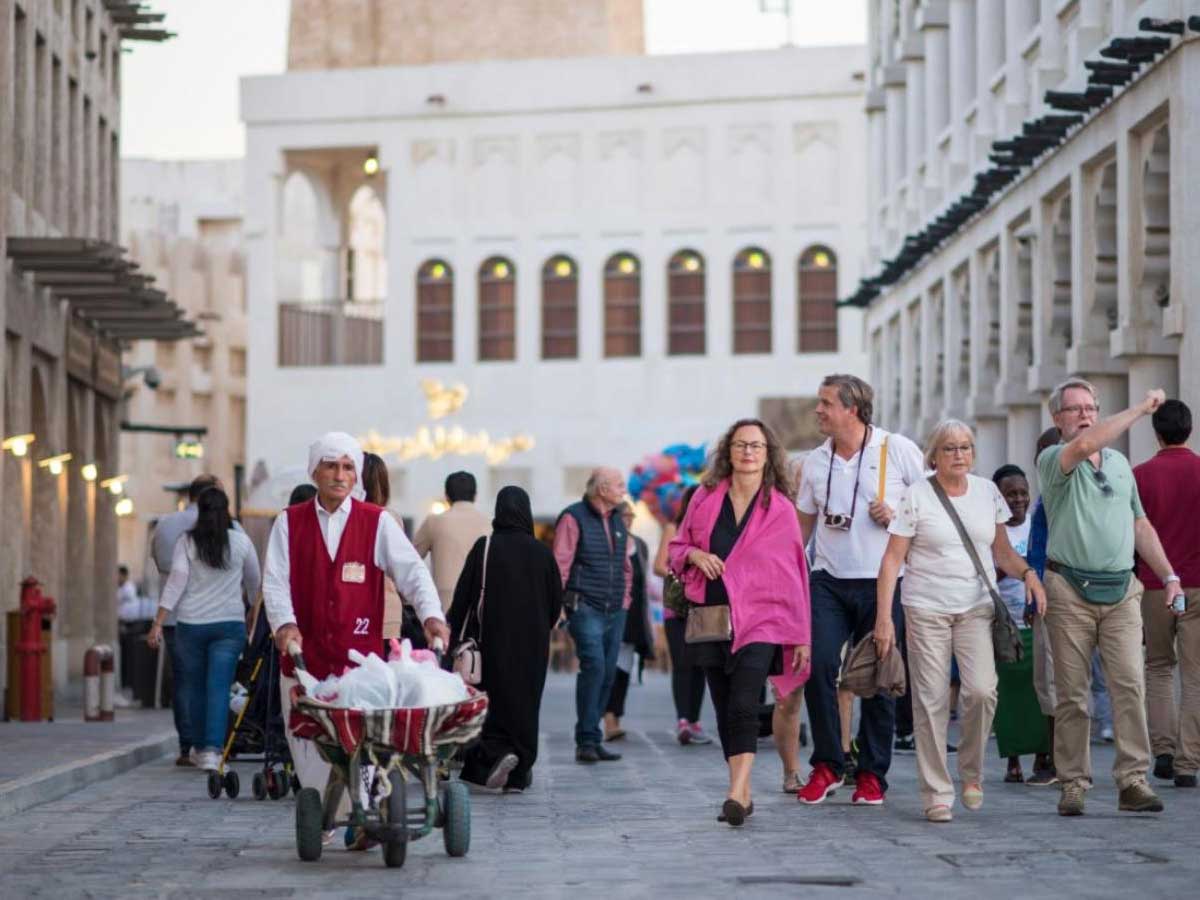Катарский гостеприимство известно своим теплом, щедрость, и уважение к гостям. Коренится в исламских традициях и бедуинских обычаях, КАТАРИ ПОДДЕРЖКА КАТАТИЧЕСКОГО ГОСУДАРСТВА отражает глубокие культурные ценности, которые определяют приоритеты в комфорте и удовлетворенности гостей. Для туристов, посещающих Катар, Понимание этих обычаев и ожиданий может значительно улучшить опыт. В этом практическом руководстве рассказывается о том, что посетители могут ожидать при входе в катарские дома или посещение мероприятий.
Суть катарского гостеприимства
По своей сути, Катарское гостеприимство вращается вокруг концепции «возлюбленный,” что приводит к щедрости и доброте по отношению к гостям. Эта традиция глубоко укоренилась в катарской культуре, где предложение гостеприимства рассматривается как отражение чести и социального положения. Посетители могут рассчитывать на то, что будут относиться с уважением и любезностью, Поскольку хозяева Катари гордятся тем, что их гости чувствуют себя желанными и ценными.
Прибытие в дом Катари
При приглашении в дом катар, Важно признать значение этого случая. Прибытие пунктуально ценится, Но быть немного опаздывающим часто приемлемо на неформальных собраниях. При входе в дом, Скорее всего, вас встретят с теплым приветствием, часто сопровождается рукопожатиями (между мужчинами) или словесные приветствия (между мужчинами и женщинами). Традиционное приветствие "Как-Привет Alaykum » (Мир будет на вас), который обычно отвечает взаимностью «Из Alaykum as-салам.”
Как посетитель, Вы можете заметить, что вход в дом часто украшен традиционным декором, отражение катарского наследия и культуры. Прежде чем войти в жилые зоны, Гостей может попросить удалить обувь в знак уважения и чистоты. Желательно следовать этой практике, Как показывает ваше понимание местных обычаев.
Закуски и предложения
Однажды внутри, Гости могут ожидать, что будут предложены закуски. Традиционный приветствие в Катаре включает Гахва (Арабский кофе) и даты. Гахва готовится в специальном кофейном горшке под названием Достопримечательности и подается в маленьких чашках. Принятие этого предложения является обычным; Если вы хотите отказаться, Сделай это вежливо и с благодарностью. Стоит отметить, что хозяин может настаивать на том, чтобы служить вам несколько раз, что является отражением их гостеприимства.
В дополнение к Гахве и свиданиям, Вам могут быть предложены другие закуски, такие как соки или безалкогольные напитки. Полезно принять эти предложения, как отказ может рассматриваться как невероятный. Если у вас есть диетические ограничения или предпочтения, Лучше всего информировать вашего хозяина заранее, Поскольку они, скорее всего, станут изо всех сил, чтобы разместить вас.
Социальный этикет
При посещении собрания или мероприятия в доме в Катари, Понимание социального этикета имеет важное значение. Уважение к старейшинам глубоко укоренилось в культуре Катара, Так что важно сначала приветствовать пожилых членов семьи. В социальных условиях, Обычно участвовать в небольших разговорах, прежде чем углубляться в более глубокие разговоры. Такие темы, как семья, здоровье, и общие интересы безопасны и ценятся.
Разговоры в культуре катарской культуры часто включают вежливые запросы о благополучии друг друга, семья, и недавние мероприятия. Однако, Желательно избежать чувствительных тем, таких как политика, религия, или личные финансы, если вы не установили тесные отношения со своим хозяином.
В смешанных собраниях, Обратите внимание, как другие взаимодействуют. В то время как мужчины и женщины могут вести разговор, Поддержание уважительных границ важно. Если вы не уверены в динамике, Лучше всего следовать лидерству вашего хозяина и других посетителей.
Блюда и столовая таможня
Катарское гостеприимство часто распространяется на сложное питание, особенно во время особых случаев или собраний. При посещении еды, Скорее всего, вы будете сидеть на больших подушках или низких стульях, Следуя традиционному стилю ресторана. Еда обычно подается в семейном стиле, с большими тарелками, помещенными в центр для всех, чтобы поделиться.
Когда дело доходит до столовой таможни, важно помнить о местном этикете. В традиционной катарской культуре, Обычно есть правой рукой, Поскольку левая рука считается невежливой для обработки пищи. Если вы не уверены в том, как ориентироваться в ресторане, Наблюдайте за своими хозяевами и следуйте их примеру.
Катарская кухня имеет богатое разнообразие блюд, включая Махаббук (пряный рис с мясом или рыбой), хумус, Таббоулех, и Shawarma. Гостям рекомендуется наслаждаться едой и съесть их наполнение. Полезно дополнять еду и выразить благодарность хозяину за их усилия. Ожидайте несколько порций, как отказ от есть, можно рассматривать как неуважительное.
Если хозяин настаивает на том, чтобы подавать вам еду или пить, Обычно вежливо отказаться один или два раза, прежде чем принимать. Эта практика отражает ценность, связанную с гостеприимством, Поскольку хозяева гордятся тем, что их гости хорошо кормили и довольны.
Посещение мероприятий и торжеств
Катарское гостеприимство распространяется на различные мероприятия и празднования, такие как свадьбы, Ид аль-Фитр, и национальный день Катара. При приглашении к таким случаям, Вы можете ожидать яркую атмосферу, наполненную музыкой, танцевать, и общая радость.
Дресс -код для событий варьируется в зависимости от случая, Но желательно одеваться скромно и с уважением. Для женщин, носить Абая распространен, Пока мужчины обычно носят Тоби. В более случайных настройках, Умный случайный наряд обычно приемлем, Но избежать чрезмерно раскрывающей одежды необходимо.
Во время событий, Гостям часто рекомендуется участвовать в традиционных танцах и мероприятиях, демонстрируя богатое культурное наследие Катара. Примирительно приветствовать других участников теплом и уважением, содействие чувству общности и связи.
Понимание культурных нюансов
В то время как гостеприимство Катара характеризуется щедростью, Важно помнить о культурных нюансах. Личное пространство и границы различаются, И желательно поддерживать уважительное расстояние, особенно при взаимодействии с противоположным полом.
Понимание значения правой руки в культуре катарских людей имеет решающее значение. Правая рука используется для приветствия, еда, и прохождение предметов, в то время как левая рука зарезервирована для менее вежливых задач. При получении или передаче кого -то, Всегда используйте правую руку.
Кроме того, Избегайте указывать пальцем, как этот жест можно считать грубым. Вместо, Используйте всю свою руку или жест более тонким образом. Обращение внимания на язык тела и невербальные сигналы также важны для навигации по социальным взаимодействиям.
Подарки и благодарность
Если вас приглашены в дом Катара или мероприятие, Задумчиво принести небольшой подарок для вашего хозяина. Общие подарки включают сладости, даты, или сувениры из вашей страны. При представлении подарка, Сделайте это правой рукой и выразите свою благодарность за приглашение.
Выражение признательности за полученное гостеприимство имеет важное значение. Спасибо вашим хозяевам как в устной форме во время вашего визита, так и через последующее сообщение или примечание. Признание их усилий усиливает добрую волю и уважение.
Заключение
Катарское гостеприимство является отражением богатого культурного наследия и глубоко укоренившихся ценностей. Как посетитель, Понимание таможни и ожиданий, связанных с гостеприимством, улучшит ваш опыт и позволит вам осмысленно взаимодействовать с обществом Катара.
Обняв тепло и щедрость катарского гостеприимства, Вы можете создать незабываемые связи и способствовать взаимному уважению со своими хозяевами и сообществом. Если вы наслаждаетесь едой, посещение празднования, или просто делиться разговором, Суть гостеприимства Катара, несомненно, оставит неизгладимое впечатление. Примите опыт, И вы обнаружите, что обогащены культурным гобеленом, который определяет эту замечательную нацию.

Катарские традиции и культура представляют собой завораживающее сочетание древнего бедуинского наследия., Исламская вера, и живой дух сообщества, который манит вас исследовать и испытать на собственном опыте.

Катарские традиции и культура представляют собой завораживающее сочетание древнего бедуинского наследия., Исламская вера, и живой дух сообщества, который манит вас исследовать и испытать на собственном опыте.
Авторское право 2024 © Все права принадлежат Qatari Culture